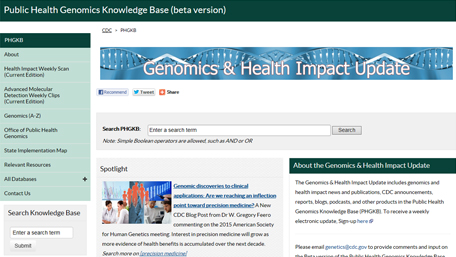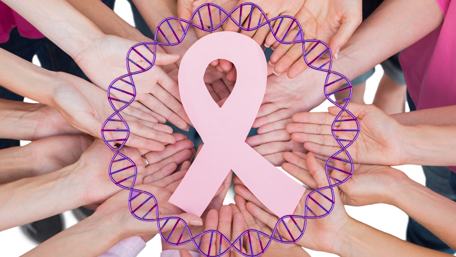Category:
Public Health Genomics 2015: Looking Back, Looking Ahead

In 2015, the United States launched the precision medicine initiative that includes a cancer component and a national cohort research study of one million or more people. While much of this initiative will take years to develop outputs for use in health care, a public health perspective is crucial to ensure the initiative’s success in Read More >
Posted on byDealing with the Genomics and Health Information Overload: Introducing the CDC Public Health Genomics Knowledge Base

Understanding genetic information is increasingly becoming important for health decision making for a variety of health conditions across the lifespan. The amount of genome-related information is growing exponentially, but it is scattered all over the web, peer-reviewed literature, and public and private databases. The CDC Office of Public Health Genomics has launched the beta version Read More >
Posted on byPrecision Medicine, Implementation Science and Public Health: How Do We Scale Up From 1 Million to 300 Million?

Planning for the 2015 Presidential Precision Medicine Initiative is in full swing. After the initial announcement in January 2015, several workshops were held to help in design and execution of the longitudinal cohort study of 1 million persons. The workshops covered important topics including a Building a Precision Medicine Research Cohort, Scientific Opportunities, Digital Health Data, Read More >
Posted on by 1 CommentPrecision Medicine and Public Health: Improving Health Now While Generating New Knowledge for the Future

In a previous post, I commented on the importance of a public health perspective to ensure the success of the proposed precision medicine large national research cohort. Here I offer additional thoughts on the need to balance short term public health gains with long term knowledge generation from this effort. Read More >
Posted on byUsing Genomics in Precision Prevention of Breast Cancer

Breast cancer is the most common cancer in women in the United States. It is estimated that 3%-5% of breast cancer cases are hereditary, most often involving mutations in BRCA1 and BRCA2 genes. Such mutations confer high lifetime risk of breast and ovarian cancer. The United States Preventive Services Task Force has issued specific recommendations Read More >
Posted on byWhen a Country Cannot be a Cohort: Challenges of Implementing a Large Precision Medicine Cohort Study in the United States

The recently proposed US precision medicine initiative promises a new era of healthcare with targeted disease treatment and prevention. It prominently features a longitudinal study of a national cohort of a million or more people to customize interventions based on a person’s genetics and other factors. The long term goal of this study is to Read More >
Posted on byPrecision Public Health and Precision Medicine: Two Peas in a Pod

The 2015 US Precision Medicine Initiative promises a new era of biomedical research and its application in health care. The initiative is enabled by rapid advances in biomedical sciences, including genomics and bioinformatics, as well as the progress in communication, information technologies and data science. Targeted cancer therapies are a near term goal for Read More >
Posted on byHuman Disease and Bad Luck: Acting on Genetic & Environmental Factors to Reduce Cancer Risk

In January 2015, a paper in Science created a “buzz” in the scientific community and the media. Based on statistical modelling, the authors suggested that “only a third of the variation in cancer risk among tissues is attributable to environmental factors or inherited predispositions. The majority is due to ‘bad luck,’ that is, random mutations Read More >
Posted on by 1 CommentThe Success of Precision Medicine Requires a Public Health Perspective

The announcement of a new major US Precision Medicine initiative comes more than a decade after the completion of the Human Genome Project, the ambitious project that culminated in sequencing all 3 billion base pairs of our genome. Continuous improvement in the quality of sequencing, dramatic reduction in price, and ongoing advances in multiple sectors Read More >
Posted on by 1 CommentEvery Cause Needs a Champion: Jean Chabut as a Public Health Genomics Pioneer
Cham·pi·on noun \ˈcham-pē-ən\: someone who fights or speaks publicly in support of a person, belief, cause, etc. Most public health programs can point to a key person or group who was instrumental in assuring not only the program’s successful introduction but also its long-term viability. Jean Chabut was that champion for public health genomics in Read More >
Posted on by 1 Comment

